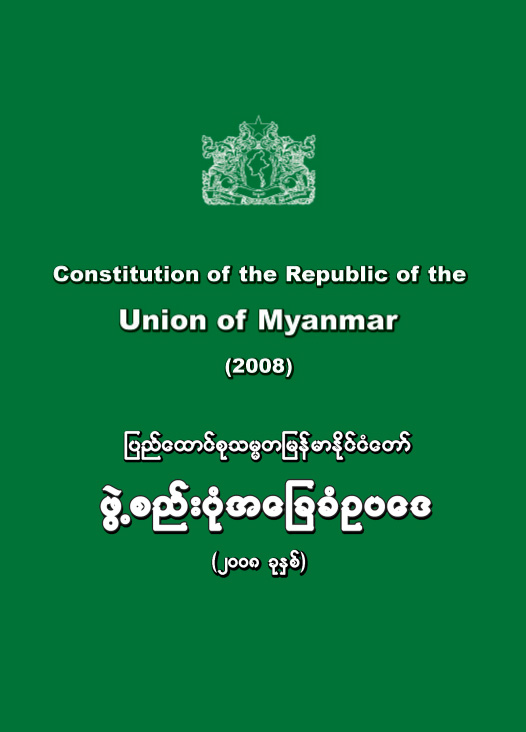Same Constitution, Same Problems
By Burma Partnership • February 18, 2013 The Special Rapporteur on the Situation of Human Rights in Myanmar, Tomás Ojea Quintana, finished his 7th visit to Burma on Saturday and his report highlights the grave human rights concerns in Burma today. The escalation of conflict in Kachin State, communal violence in Arakan State, the continuing detention and torture of political prisoners, land confiscation due to development projects, restrictions on freedom of association and assembly are among the poor human rights conditions stated in his report. The scale of such human rights violations, in spite of the reforms initiated by the government, emphasizes the necessity of the role of the Special Rapporteur.
The Special Rapporteur on the Situation of Human Rights in Myanmar, Tomás Ojea Quintana, finished his 7th visit to Burma on Saturday and his report highlights the grave human rights concerns in Burma today. The escalation of conflict in Kachin State, communal violence in Arakan State, the continuing detention and torture of political prisoners, land confiscation due to development projects, restrictions on freedom of association and assembly are among the poor human rights conditions stated in his report. The scale of such human rights violations, in spite of the reforms initiated by the government, emphasizes the necessity of the role of the Special Rapporteur.
Many of the human rights violations that Quintana reported have a direct obstacle in the path of correcting these abuses: the 2008 Constitution. The 2008 Constitution was written by the military without Daw Aung San Suu Kyi and the National League for Democracy or genuine representation from Burma’s ethnic areas. It was described by the 88 Generation Students Group as a “sham constitution” and through corruption, fraud and intimidation, the ruling junta outrageously claimed that 92% of the people who voted ratified the document.
For decades, ethnic non-state armed groups have been fighting for the rights and equality for their people, and the formation of a federal union of Burma. Yet the 2008 Constitution solidifies central rule over the whole country. It guarantees the Burma Army a prominent role in the legislative and the executive by stipulating that 25% of parliamentary seats are reserved for military members. The very institution that has repressed, intimidated, and in ethnic areas, waged war on local communities has institutionalized its power through the constitution. For there to be sustainable peace in ethnic areas, a particularly pressing issue in Kachin State right now, political talks around repealing or amending the 2008 Constitution must begin. Although political dialogue has been promised by both the leader of the government’s peace negotiation team, Aung Min, and this week by President Thein Sein, such talks haven’t happened yet. The government is more concerned with strengthening its relationship with the international community, largely based on development and economic interests than a political settlement, as is evidenced by President Thein Sein’s comments in his recent talks with ethnic leaders. Nai Tala Nyi from the New Mon State Party said, “he told us to develop our ethnic areas while we are waiting to have political dialogue with the government.”
Land confiscation has become a huge issue in Burma, whether in ethnic regions or central cities. The 2008 Constitution spells out that the state owns “all lands, and all natural resources above and below the ground, above and beneath the water and in the atmosphere.” This paves the way for the government to take people’s land for development projects, new military bases or to sell to the highest bidder.
These land grabs are in anticipation of new investment as Burma’s economy opens up to the outside world. But people are also attempting to resist this arbitrary land confiscation, as seen in the resumption of the protests against the Letpadaung copper mine last week. The freedom of association and expression concerns that Quintana stated are evident in this joint venture between a Burma Army owned company and a Chinese company. After protests last year over land grabs and environmental damage that this mine is causing, the government responded with a brutal crackdown, using incendiary devices and water cannons to disperse protesters, injuring over 100 monks.
The Special Rapporteur finishes his report by addressing the necessity of justice and accountability for human rights violations: “I believe this is crucial for the process of national reconciliation and to prevent future human rights violations by learning from the past.” Yet the 2008 Constitution enshrines impunity for past violations as military personnel from the regime were given a blanket amnesty as well as establishing military tribunals for abuses occurring today rather than using civilian courts. This effectively puts the Burma Army above the law yet they are the perpetrators of the worst human rights abuses in Burma.
The 2008 Constitution is a significant barrier to solving many of the human rights violations occurring in Burma today. It also prevents a sustainable peace settlement with the ethnic nationalities as it entrenches inequality. Until the government repeals or significantly amends this constitution, Burma will not become a functioning democracy.
Tags: 2008 Constitution, Land Confiscation, Rule of Law, Tomas Ojea QuintanaThis post is in: Blog
Related PostsMyanmar: Release Four “Rohingya Calendar” Political Prisoners
Burma: Rights Priorities for New Government
Myanmar: Scrap or Amend new Law that could Grant Immunity to Former Presidents
Burma Army Moves to Tighten Grip on Power
Sounds of War Taint the Cheers of Election Success









 All posts
All posts